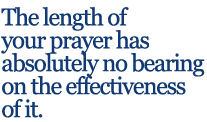Sense & Nonsense About Prayer
What It Is, What It's Not, How It Works
11. The Beginning of Wisdom
The Bible says that the fear of God is the beginning of wisdom
[Psalm 111:10]. By “fear,” what the word means is “Holy
reverence for who God is and for what He can do.” The problem
with so many Christians these days is we simply no longer fear
God. Which is odd, considering the terrible evidence of global
warming, the great climactic disasters we’ve suffered and
continue to suffer, and the terrible political turmoil going on
in the world. In these desperate economic times, these times of
war and famine and disease, so many “Christians” still continue
to tempt God by living lives that are not markedly different
from the way so-called “sinners” live. Sexual impurity is,
likely, chief among our sins, but our biggest sin is likely
intolerance of one another. Running our big mouths constantly,
tearing one another down with gossip. Stabbing one another in
the back just so we can feel better about ourselves.
All of this undermines the effectiveness of our prayers. And
there’s absolutely no sense getting mad at God when He doesn’t
perform the way we want Him to.
12. Let God Do His Job
Perhaps the biggest mistake we make in our prayer life is we
want to tell God not only what we want or what we need but in
what manner He should act. We say, “Lord, please talk to my boss
and make him give me a raise.” This limits God’s options. We’re
tying God’s hands because we’ve so narrowed down the course of
action that His response is often, “no.” For if He did,
specifically, what we asked him to do, chances are that would
harm us in some way, somewhere down the road. The worst thing
God can imagine is us becoming separated from Him. His only
motive in denying our request is preventing that separation from
occurring. He desires for us to dwell with Him, abide in Him.
And He knows, if we get our way, many of us simply wouldn’t be
able to handle the very life change we’re asking for. It would
corrupt us and cripple our relationship with God.
Don’t direct God. Don’t tie Him up in knots. The proper way to
pray is not to pray for a specific action but pray for a need.
Rather than pray that God would change your boss’ mind, pray
that God would meet your household’s needs. A more appropriate
prayer is, “Lord, we need help managing our finances. Please
open doors and please give us the wisdom to see those doors
opened and the courage to step through them.” This gives God a
lot more options to provide creative solutions to your problems,
solutions that may have absolutely nothing to do with your boss.
Many of us are impatient. We help God out by taking matters into
our own hands instead of being patient and trusting Him. We pray
for the solution but we fail to pray for the wisdom to actually
see and know the solution when it’s right in front of us.
Most of our prayers fail because we pray for the wrong things.
And, not only that, but we dictate to God the manner in which He
should accomplish those things.

13. Keep The Line Open
At this camp I was taught to pray when I got up in the morning.
To pray about what to wear. Which socks. Lord, which tie should
I put on? To pray while I’m brushing my teeth. To pray while
walking across the field to the chapel. I was taught to keep the
line open. Too many of us close prayers with “Amen,” a practice
we should stop doing because, in our mindset, “Amen” ends the
prayer. Which is not true. “Amen” simply means “certainly” or
“so let it be.” It does not mean, “Our connection to God is
hereby closed.”
We should start prayer when our eyes open. “What would You have
me to do today, God?” And leave off the “Amen.” Just leave the
connection open. All day. Every day. Don’t worry about tying up
the line—He’s never too busy for you.
Praying over what dress to wear or what jacket to put on may
seem trifling and stupid. There are no trifling or stupid
matters to your Holy Father. And if you’d invite Him into even
these choices and decisions, you will begin to walk in the
Spirit [Galatians 5:16]. You’ll begin to invoke the presence of
the Holy Spirit in every move you make. And that will not only
greatly improve your walk with God, but it will exponentially
improve the effectiveness of your prayers.
By keeping the connection open, there’ll be music you won’t
listen to. If God’s in the car with you, you won’t be listening
to music that requires “Explicit Content” warnings. You’ll be
less likely to grieve the Holy Spirit by watching moronic idiocy
like “Flava of Love” and other idiot shows designed to showcase
how stupid black people are. If your Holy Father is in the room
with you, you’re much less likely to take that man or that woman
you’re not married to to bed.
14. Give God Time
One of the reasons our prayers are ineffective si we say what we came to say and get up, going about our day. we're too much in a hurry, too distracted by the concerns of the day. When we pray, we need to stop talking and listen—really listen—to what God is saying. Give Him time to speak to us, to inspire us and lead us to the answers we are seeking.
15. Already Answered
Finally, the most tragic product of a poor prayer life is our
spiritual blinders. God has, quite often, already answered our
prayer and we don’t even know it. We’re busy looking for the
burning bush or the sign in the sky. But that’s not how God
moves. God moves as often through motivation as through
demonstration. He simply brings things to pass that He is
motivated to bring to pass. And the answers we are seeking are,
more often than not, already here. We’re just walking past and
ignoring them because we’re not spiritually in tune with God.
We're expecting God to move in a way we ourselves have outlined
for Him.
The worst thing a detective can have is an opinion. Having an
opinion about who done it blinds the detective to the evidence
before him. At the outset, it may lo kike it was Professor Plumb
in the study with an ice pick. But a good detective leaves his
opinion of such matters at home and follows the evidence to,
perhaps, the maid in the kitchen with a screwdriver.
When we bring our opinion, our vision, of how God should move
and when God should move, we set up expectations that are likely
to be disappointed. It blinds us to seeing how God has already
moved. How He has already worked things out in our favor. We
can’t see it because we’ve brought our process, our opinion,
into the matter. When we should approach the things of God with
an open mind, praying not only for our needs to be met but for
the wisdom to know that they have and the patience to wait.
Christopher J. Priest
4 June 2006
editor@praisenet.org
TOP OF PAGE






